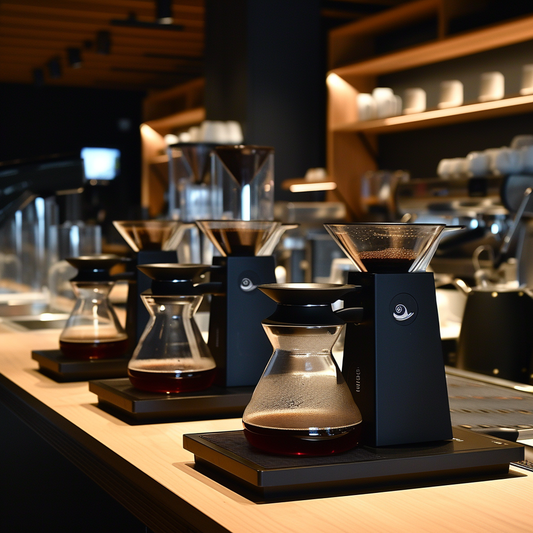For coffee lovers following a vegan, lactose-free, or plant-based diet, finding the perfect non-dairy milk alternative can be a game-changer. Traditional dairy milk is no longer the only option for creating rich, creamy coffee beverages. With the rise of innovative plant-based alternatives, the world of coffee has expanded, offering a diverse range of flavors and textures to explore. In this guide, we'll dive into the world of non-dairy milk alternatives, examining their unique characteristics, flavor profiles, and how they pair with some of your favorite coffee brews.
The Rise of Plant-Based Diets

Over the past decade, there has been a significant shift towards embracing plant-based diets for various reasons, including ethical concerns, environmental sustainability, and health benefits. As a result, the demand for non-dairy milk alternatives has skyrocketed, with consumers seeking out options that align with their dietary preferences and values. Coffee shops and cafes have responded by expanding their non-dairy offerings, catering to this growing market.
Factors to Consider When Choosing a Non-Dairy Milk Alternative
Before we explore the different non-dairy milk alternatives, it's essential to understand the factors that can influence your choice:
Flavor Profile
Each plant-based milk alternative has its unique flavor profile, ranging from nutty to creamy, sweet, or even slightly savory. Considering your personal taste preferences and how the milk alternative will complement your coffee is crucial. For example, the rich creaminess of oat milk pairs beautifully with Roasted Origins' Cowboy Blend, accentuating its caramel and vanilla notes.
Texture and Mouthfeel
The texture and mouthfeel of the milk alternative can greatly impact the overall drinking experience. Some alternatives foam better than others, making them ideal for espresso-based drinks or latte art. Soy milk and cashew milk are excellent foamers, perfect for creating velvety microfoam for lattes made with Roasted Origins' African Espresso blend.
Nutritional Value
Plant-based milk alternatives vary in their nutritional compositions, offering different levels of proteins, fats, and carbohydrates. For those with specific dietary requirements or goals, understanding the nutritional profiles can help make an informed choice. Nut-based milks like almond milk are lower in calories but still provide a creamy mouthfeel for coffee drinks made with lighter roasts like Roasted Origins' Tanzania or Ethiopia Natural.
Allergies and Intolerances
Many non-dairy milk alternatives are suitable for those with lactose intolerance or milk allergies, but some may contain potential allergens like nuts or soy. Always check labels and ingredients to ensure the milk alternative aligns with your dietary needs. Rice milk and oat milk are great nut-free, allergy-friendly options to try with Roasted Origins' smooth Cold Brew blend.
Popular Non-Dairy Milk Alternatives
Almond Milk

Description: Made from blended almonds and water, almond milk has a nutty, slightly sweet flavor.
Pros: Low in calories, rich in vitamin E, and suitable for those with nut allergies (as long as it's made in a nut-free facility).
Cons: Relatively low in protein, and some brands may contain additives or thickeners.
Best for: Cappuccinos, lattes, and iced coffee beverages made with bright, fruity origins like our Costa Rica Single Origins Coffee.
Oat Milk

Description: Derived from soaked and blended oats, oat milk has a creamy, slightly sweet taste.
Pros: Naturally thick and foams well, making it ideal for latte art. It's also nut-free and typically fortified with vitamins and minerals.
Cons: May not be suitable for those with gluten sensitivities, and some brands contain added oils or sweeteners.
Best for: Lattes, cappuccinos, and any coffee drink requiring a rich, frothy texture paired with bolder blends. We recommend our 6 Bean Blend or Cowboy Blend.
Soy Milk

Description: Made from soaked and blended soybeans, soy milk has a slightly nutty, creamy flavor.
Pros: High in protein, making it a popular choice for those following a plant-based diet. It also foams well for lattes and cappuccinos.
Cons: May not be suitable for those with soy allergies or sensitivities, and some brands contain additives or thickeners.
Best for: Lattes, cappuccinos, and any coffee drink where you want a protein boost. We recommend our Bali Blue Single Origins Coffee.
Coconut Milk

Description: Extracted from the meat of mature coconuts, coconut milk has a rich, creamy texture and subtle coconut flavor.
Pros: Dairy-free, nut-free, and suitable for those following a vegan or paleo diet. It adds a luxurious mouthfeel to coffee drinks.
Cons: High in saturated fat and calories, and the coconut flavor may not complement certain coffee blends.
Best for: Iced coffee drinks, frappes, and beverages made with our flavored coffees like Mexican Chocolate or Chocolate Hazelnut for a unique twist.
Rice Milk

Description: Made by blending cooked rice with water, rice milk has a light, slightly sweet flavor.
Pros: Naturally dairy-free, nut-free, and suitable for those with multiple allergies or intolerances.
Cons: Low in protein and may separate or curdle when added to hot beverages.
Best for: Iced coffee drinks using mellower origins like our Brazil Santos Single Origin Coffee.
Cashew Milk

Description: Creamy and slightly nutty, cashew milk is made by blending cashews with water.
Pros: Rich in healthy fats and naturally dairy-free and vegan-friendly.
Cons: May not be suitable for those with nut allergies, and it can be relatively high in calories.
Best for: Lattes and cappuccinos made with medium-bodied blends.
Hemp Milk

Description: Made from blended hemp seeds, hemp milk has a slightly nutty, creamy taste.
Pros: Naturally dairy-free, nut-free, and a good source of plant-based protein and omega-3 fatty acids.
Cons: Can have a distinct earthy flavor that may not complement all coffee blends.
Best for: Smoothies, iced coffee drinks, or any beverage using Roasted Origins' vibrant Guatemalan Single Origin Coffee where you want an added protein boost.
Barista Tips for Working with Non-Dairy Milk Alternatives

While non-dairy milk alternatives offer exciting possibilities for coffee drinks, they can behave differently than traditional dairy milk. Here are some tips for baristas working with these alternatives:
Frothing and Foaming
Some non-dairy milk alternatives foam better than others, so experimenting with techniques and temperatures is essential. Oat milk, soy milk, and cashew milk tend to foam well, while almond milk and rice milk can be more challenging.
Heating and Steaming
Be mindful of the heating and steaming temperatures, as some alternatives can separate, curdle, or develop an unpleasant flavor when overheated. Follow the manufacturer's guidelines or adjust the temperature slightly lower than you would for dairy milk.
Ratios and Measurements
Non-dairy milk alternatives may require different ratios or measurements than dairy milk to achieve the desired texture and flavor balance. Start with the recommended ratios and adjust based on your preferences and the specific drink you're preparing.
Flavor Pairing
Consider the flavor profile of the non-dairy milk alternative and how it will complement (or contrast) the coffee blend you're using. For example, coconut milk pairs well with nutty or chocolatey coffee blends, while almond milk complements fruity or bright coffee flavors.
Shelf Life and Storage
Non-dairy milk alternatives can have varying shelf lives, so be mindful of expiration dates and storage instructions. Some alternatives may separate or develop off-flavors if not stored properly, so refrigerate after opening and give them a good shake before use.
Experimenting and Exploring Flavors
The world of non-dairy milk alternatives for coffee is constantly evolving, with new options and innovations emerging regularly. Don't be afraid to experiment and try different combinations to find your perfect match. Whether you're a seasoned barista or a coffee enthusiast at home, embracing these plant-based alternatives can open up a whole new realm of flavors and textures to explore.
Bring On The Coffee!
As the demand for plant-based and dairy-free options continues to rise, non-dairy milk alternatives have become an integral part of the coffee industry. From creamy oat milk to nutty almond milk and exotic coconut milk, the choices are vast and cater to various dietary preferences and taste profiles. By understanding the unique characteristics of each alternative, you can elevate your coffee experience and discover new flavor combinations that delight your senses. Embrace the world of non-dairy milk alternatives and embark on a delicious journey of exploration and innovation in your daily cup of coffee!






